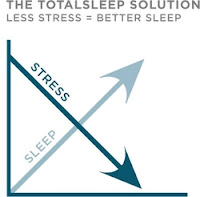Is stress keeping you up at night? Many people who have difficulty falling asleep report that their mind is on overdrive when it should be coasting into neutral. Unfortunately, lack of adequate sleep prevents the mind from being fully efficient the next day, let alone the toll it can take on physical health. And to complete the loop, lack of sleep can contribute to feelings of stress! If you find that your body needs to rest but your brain won’t cooperate, try these strategies for a more restful sleep.
BREATHING
If you can slow down your breathing, it engages your parasympathetic nervous system (the part responsible for helping you to relax) and turns off the “fight or flight” response. Try counting how long it takes you to inhale and exhale and then intentionally lengthening it by one more second with each breath until you are taking easy, full deep breaths. If you can extend the exhale to be longer than the inhale, that is even more beneficial for winding down.
PROGRESSIVE RELAXATION
Stress affects many aspects of your body. Some are easier to control than others. While it might be hard for us to change our rate of digestion, we can easily change the action of our muscles as long as we realize what is happening. When you intentionally relax your muscles, your organs stop reacting to the stress also. Start at the top of your head or the bottom of your feet and think about relaxing the muscles in each body part. If you know where you tend to hold your stress the most (maybe your eyes and jaw, shoulders or lower back), you can specifically target those areas and try to relax them first.
You will probably notice natural changes to your breathing and you will start to feel less stressed when you let go of that tension. You might even start to doze off before you finish scanning the whole body!
You will probably notice natural changes to your breathing and you will start to feel less stressed when you let go of that tension. You might even start to doze off before you finish scanning the whole body!
WRITING
Research has shown that just the act of writing things down can reduce stress. For people who have trouble sleeping, I often suggest keeping a notepad by the bed to jot down their thoughts before trying to sleep, or when having trouble sleeping. When you get it out of your head and onto the page, you don’t have to hold on and continuously worry about it. You can come back to it later, when you are more calm and of clearer mind. Writing can also help you work through a dilemma. It engages your right brain, whereas just thinking about it is more of a left-brain activity.
PERSPECTIVE
Ask yourself how important this issue really is in the larger scheme of things. In 20 years, will you care about this? Will anyone else? Think about the whole planet and the generations before and after you. How much does this matter? Is it worth making yourself sick and tired? Sometimes you just need to give yourself a little reality check to be able to let go. You can even imagine your stresses in helium balloons that you send floating off into the distance and beyond your view.
ENVIRONMENT
Make sure the room is dark and quiet, lacking unnecessary stimulation. Be sure the temperature of the room and your bed are comfortable.
ACTIONS
Aim to go to sleep at the same time every night. If you are on rotating shifts, keep consistency while on one shift, even on your days off (if possible). Stop eating 3 hours before bedtime. If you are very hungry, have something light, like a piece of fruit. Turn off any screens (television, computer) one hour before going to bed. The lights, sound, and movement stimulate the brain and impact sleep patterns. While exercising late in the evening can make it more difficult to fall asleep, exercising earlier in the day (at least 3 hours before bedtime) can actually improve sleep quality. When you exercise, try to push yourself enough that your heart rate is elevated and breathing is labored. This type of challenging exercise has the greatest benefits for sleep.
GET HELP
If you continue to have difficulties with sleep and/or stress, contact your EAP. When you can work through mental and emotional challenges during waking hours, they are less likely to be spinning in your head when it is time to wind down. If you need any assistance with this process, contact us and we can help get you connected.
Good night and sleep tight!
(If you'd like to receive notification when a new entry is posted, click the link on the right to "follow" this blog, or e-mail shaaz@corporatehealthsolutions.com)
(If you'd like to receive notification when a new entry is posted, click the link on the right to "follow" this blog, or e-mail shaaz@corporatehealthsolutions.com)





No comments:
Post a Comment